人教版PEP小学英语六年级上册
人教版pep小学英语六年级上册_新pep小学英语六年级上册教案(优秀8篇)
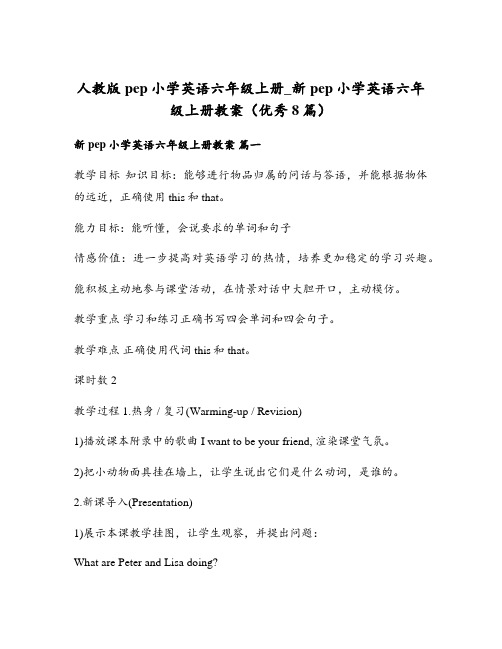
人教版pep小学英语六年级上册_新pep小学英语六年级上册教案(优秀8篇)新pep小学英语六年级上册教案篇一教学目标知识目标:能够进行物品归属的问话与答语,并能根据物体的远近,正确使用this和that。
能力目标:能听懂,会说要求的单词和句子情感价值:进一步提高对英语学习的热情,培养更加稳定的学习兴趣。
能积极主动地参与课堂活动,在情景对话中大胆开口,主动模仿。
教学重点学习和练习正确书写四会单词和四会句子。
教学难点正确使用代词this和that。
课时数 2教学过程 1.热身 / 复习(Warming-up / Revision)1)播放课本附录中的歌曲I want to be your friend, 渲染课堂气氛。
2)把小动物面具挂在墙上,让学生说出它们是什么动词,是谁的。
2.新课导入(Presentation)1)展示本课教学挂图,让学生观察,并提出问题:What are Peter and Lisa doing?What are they talking about?2)播放本课录音,让学生听,然后讨论自己的猜测是否正确。
3)再放录音,让学生仔细听:谁扮演bear?谁的头饰找不到了?最后找到了吗?4)指导学生跟读录音。
5)让学生四人一组分角色表演会话。
6)鼓励学生戴面具到讲台上来表演。
3.趣味操练(Practice)1)教师将全班划分成6~8个小组,每组发一张白纸,每张白纸的最上面都写有“失物招领处”。
要求每组画出3~4种物品,供其它组认领。
2)每组分成两部分,一部分当失主去其它组找丢失物品,另一部分留在本组提供物品。
用所学句型进行交际活动。
3)播放本课投影片,让学生边看边配音。
4. 拓展活动(Additional activities)1)回家听本课录音,模仿语音语调。
2)把本课对话改编或故事,讲给父母听。
课后反思新pep小学英语六年级上册教案篇二教学功能:Talking about past activitiesTarget Language: Did you…?Yes, I did. / No, I didn’t.教学目标:Vocabulary: dear, met (meet), ran (run)Pronunciation: /i:/, /I/, /e/, / /Song: Where did you go?教学过程:一、Warm-up1. Review verb phrases.2. Review Unit 1.二、Introduction1. Prepare a postcard with a picture of own city and ask the children: What’s this? What is the place? What can you see?2. Show the back of the postcard and tell the children that Lingling wrote a letter on it.三、Presentation1. Play the cassette and pause after each utterance for the children to repeat and tick the actions: went to the park, met John, bought ice creams, went home, ran to the bus, dropped.2. Play the cassette again and ask the children answer the following questions: Who wrote the postcard? Whom did Lingling send the postcard to?3. Write down the words: met, bought, went, ran, dropped and ask the children to guess the original form.4. Finish activity 2. Ask the children to ask and answer in pairs.四、Sing a song1. Ask the children to look at the pictures carefully.2. Play the cassette and ask the children to listen carefully.3. Teach the sentences of the song one by one.4. Play the cassette several times and ask the children to sing along.五、Homework1. Read the letter and sing the song.2. Finish activity 6: sentence relay.2021版pep小学英语六年级上册教案篇三单元教学目标1、能力目标(1)能听懂会说认读本单元关于形容词比较级的单词。
人教版(PEP)小学英语六年级上册知识点归纳

人教版(PEP)小学英语六年级上册知识点归纳Unit 1: How Can I Get There?In this unit。
we will learn some XXX.1.Key Words:Museum: a place where you can see art。
historical objects。
and other XXX.Bookstore: a shop where you can buy books.Cinema: a place where you can watch movies.XXX: to change n.Hospital: a place where people go to get medical treatment.Left: the opposite of right.Post office: a place where you can send letters and packages.Science: the study of the natural world.Right: the opposite of left.Straight: without XXX.Crossing: a place where two or XXX.eful Phrases:Post office: "Where is the post office?"Science museum: "Where is the science museum?"Pet hospital: "Where is the pet hospital?"XXX: "Where is XXX?"XXX: "Where is Beihai Park?"Palace Museum: "Where is the Palace Museum?"Go straight: "Go straight and you will see the bookstore on your left."Turn right/left: "Turn right at the crossing and you will see the hospital on your right."Next to: "The cinema is next to the bookstore."In front of: "The school is in front of the park."Near the park: "XXX is near the park."XXX: "XXX."mon ns:Excuse me: "Excuse me。
PEP人教版六年级英语上册全册课件【完整版】
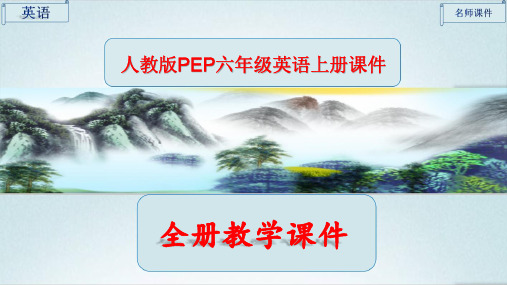
bookstore
near hospital
In front of
next to
turn left
beside
bookstore
near hospital
Story time
或点击此处播放视频
点击图片,播放视频
词汇:
science museum、post office、 bookstore、cinema、hospital、 crossing、turn、left、straight、 right
Q1:What does Wu Yifan want to buy? He wants to buy a postcard.
Q2:Where is the museum shop/post office? The museum shop is near the door. The post office is next to the museum.
hospital
science museum
Make a map and talk
pet hospital
park
There is a pet hospital in my city.
Where is it ?
It’s near the park.
Group work
pet hospital bookstore
Robin: I don’t know. I'll ask. Excuse me, sir. Man: Wow! A talking robot! What a great museum! Robin: Where is the post office? Man: It's next to the museum.
PEP人教版小学六年级英语上册知识点
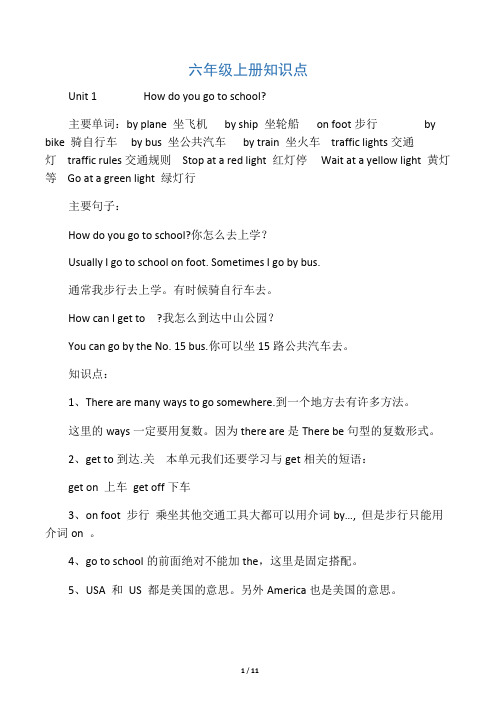
六年级上册知识点Unit 1 How do you go to school?主要单词:by plane 坐飞机by ship 坐轮船on foot步行by bike 骑自行车by bus 坐公共汽车by train 坐火车traffic lights交通灯traffic rules交通规则Stop at a red light 红灯停Wait at a yellow light 黄灯等Go at a green light 绿灯行主要句子:How do you go to school?你怎么去上学?Usually I go to school on foot. Sometimes I go by bus.通常我步行去上学。
有时候骑自行车去。
How can I get to ?我怎么到达中山公园?You can go by the No. 15 bus.你可以坐15路公共汽车去。
知识点:1、There are many ways to go somewhere.到一个地方去有许多方法。
这里的ways一定要用复数。
因为there are是There be句型的复数形式。
2、get to到达.关本单元我们还要学习与get相关的短语:get on 上车get off下车3、on foot 步行乘坐其他交通工具大都可以用介词by…, 但是步行只能用介词on 。
4、go to school的前面绝对不能加the,这里是固定搭配。
5、USA 和US 都是美国的意思。
另外America也是美国的意思。
6 go to the park前面一定要加the.如果要去的地方有具体的名字,就不能再加the , 如果要去的地方没有具体名字,由要在前面加the. go to school除外。
7、How do you go to …?你怎样到达某个地方?如果要问的是第三人称单数,则要用:How does he/she…go to …?8、反义词:get on(上车)---get off(下车) near(近的)—far(远的) fast(快的)—slow(慢的) because(因为)—why(为什么)same(相同的)—different(不同的)9、近义词:see you---goodbye sure---certainly---of course0、频度副词:always 总是,一直usually 通常often经常sometimes 有时候never 从来不Unit 2 Where is the science museum?主要单词:library 图书馆post office 邮局hospital医院cinema 电影院bookstore书店science museum科学博物馆turn left向左转turn right 向右转go straight 直行north北south南east东west西主要句子:Where is the cinema, please? 请问电影院在哪里?It’s next to the hospital. 它与医院相邻。
(Unit 1)小学英语人教版PEP六年级上册知识汇总

Unit1四会词(会听说读写)考查形式:听力或笔试补全单词题PA science museum科学博物馆post office邮局bookstore书店cinema电影院hospital医院PB crossing十字路口turn left左转go straight直走turn right右转三会词(会听说读)考查形式:笔试第一大题选择不同类(同类)一项postcard 明信片send寄(信)excuse me打扰一下pet hospital宠物医院interesting有趣的film电影Italian意大利的restaurant餐馆map地图compass指南针BDS北斗导航star星星give给feature功能follow me跟着我work奏效far较远的tell告诉ask询问旧词next to紧邻near在旁边beside在旁边behind在后面between在中间in front of在前面library图书馆--It's next to the bookstore.(电影院)在图书馆旁边。
--Where is the museum shop?博物馆商店在哪里?--It’s near the door.(博物馆商店)在大门旁边。
I want to buy a postcard.我想要买一张明信片。
What a great museum!多棒的一个博物馆呀!What an interesting film!多么有趣的一部电影呀!I know a great Italian restaurant.我知道一间很棒的意大利餐馆。
It's next to the park on Dongfang Street.它在东方街上的公园旁边。
How can we get there?我们怎么到那儿呢?How can we get to the library?我们怎么到达图书馆呢Turn left at the bookstore.Then turn right at the hospital.到书店左转。
人教版PEP小学英语六年级上册重点句型及语法知识汇总

人教版PEP小学英语六年级上册重点句型及语法知识汇总Unit 1 How can I get there?重点单词XXX。
post office邮局,XXX。
XXX。
XXX。
crossing十字路口。
turn left左转。
turn right右转。
gostraight直走。
map地图。
compass指南针。
GPS全球定位系统。
stars星星。
XXX意大利餐厅。
getto到达。
重点句型1.---Where is the restaurant?餐厅在哪里?It’s next to the park on Dong fang Street.它在东方路,在公园附近。
2.---How can we get there?我们怎么去哪里?XXX left XXX.书店左转,然后病院右转。
3.He now has GPS.他现在有GPS。
4.What an interesting film!何等风趣的片子!方位词复:XXX紧挨着,near在。
邻近,XXX在。
背面,XXX在。
旁边,in front of在。
前面。
Unit 2 Ways to go to school重点单词on foot走路。
by bike骑车。
by bus乘公交。
by train乘火车。
XXX乘地铁。
by ship搭船。
by XXX乘飞机。
slow down 慢下来。
XXX交通灯。
traffic rules交通划定规矩。
go/come to school上学。
by sled坐雪橇。
byferry坐轮渡。
pay n to留意。
traffic lights交通灯。
and wait at a red light红灯停等一等。
slow downand。
at a yellow light黄灯减速并停下。
Go XXX。
重点句型1.---How do you come to school?你怎么上学?----Usually。
I come on foot.通常我走路来的。
人教版(PEP)小学英语六年级上册全册知识点(含作文)
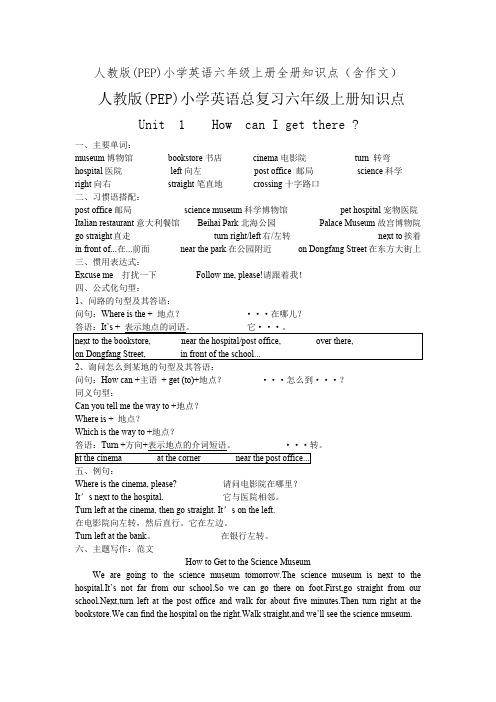
人教版(PEP)小学英语六年级上册全册知识点(含作文)人教版(PEP)小学英语总复习六年级上册知识点Unit 1 How can I get there ?一、主要单词:museum博物馆bookstore书店cinema电影院turn 转弯hospital医院left向左post office 邮局science科学right向右straight笔直地crossing十字路口二、习惯语搭配:post office邮局science museum科学博物馆pet hospital宠物医院Italian restaurant意大利餐馆Beihai Park北海公园Palace Museum故宫博物院go straight直走turn right/left右/左转next to挨着in front of...在...前面near the park在公园附近on Dongfang Street在东方大街上三、惯用表达式:Excuse me 打扰一下Follow me, please!请跟着我!四、公式化句型:1、问路的句型及其答语:问句:Where is the + 地点?···在哪儿?答语:It’s + 表示地点的词语。
它···。
next to the bookstore, near the hospital/post office, over there,on Dongfang Street, in front of the school...2、询问怎么到某地的句型及其答语:问句:How can +主语+ get (to)+地点?···怎么到···?同义句型:Can you tell me the way to +地点?Where is + 地点?Which is the way to +地点?答语:Turn +方向+表示地点的介词短语。
人教PEP六年级上册英语《Unit1PartBLet'stry-Let'stalk》说课稿
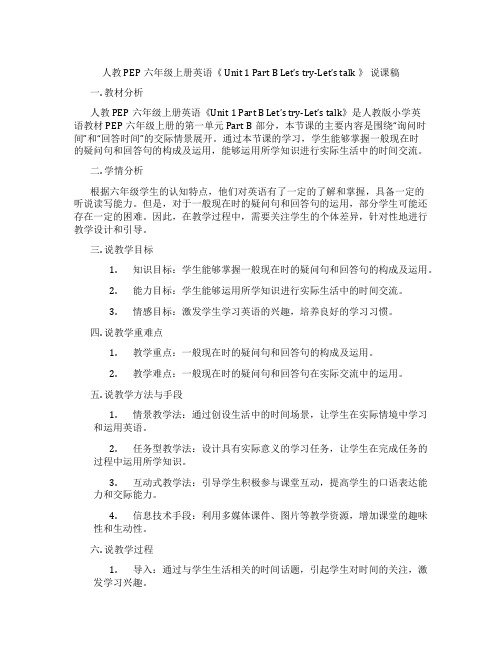
人教PEP六年级上册英语《Unit 1 Part B Let’s try-Let’s talk 》说课稿一. 教材分析人教PEP六年级上册英语《Unit 1 Part B Let’s try-Let’s talk》是人教版小学英语教材PEP六年级上册的第一单元Part B部分,本节课的主要内容是围绕“询问时间”和“回答时间”的交际情景展开。
通过本节课的学习,学生能够掌握一般现在时的疑问句和回答句的构成及运用,能够运用所学知识进行实际生活中的时间交流。
二. 学情分析根据六年级学生的认知特点,他们对英语有了一定的了解和掌握,具备一定的听说读写能力。
但是,对于一般现在时的疑问句和回答句的运用,部分学生可能还存在一定的困难。
因此,在教学过程中,需要关注学生的个体差异,针对性地进行教学设计和引导。
三. 说教学目标1.知识目标:学生能够掌握一般现在时的疑问句和回答句的构成及运用。
2.能力目标:学生能够运用所学知识进行实际生活中的时间交流。
3.情感目标:激发学生学习英语的兴趣,培养良好的学习习惯。
四. 说教学重难点1.教学重点:一般现在时的疑问句和回答句的构成及运用。
2.教学难点:一般现在时的疑问句和回答句在实际交流中的运用。
五. 说教学方法与手段1.情景教学法:通过创设生活中的时间场景,让学生在实际情境中学习和运用英语。
2.任务型教学法:设计具有实际意义的学习任务,让学生在完成任务的过程中运用所学知识。
3.互动式教学法:引导学生积极参与课堂互动,提高学生的口语表达能力和交际能力。
4.信息技术手段:利用多媒体课件、图片等教学资源,增加课堂的趣味性和生动性。
六. 说教学过程1.导入:通过与学生生活相关的时间话题,引起学生对时间的关注,激发学习兴趣。
2.呈现:展示一般现在时的疑问句和回答句的图片,引导学生观察和理解。
3.操练:让学生分组进行角色扮演,模拟实际生活中的时间交流情景,巩固所学知识。
4.实践:设计具有实际意义的时间任务,让学生在完成任务的过程中运用所学知识。
人教版pep小学英语六年级上册单词表(带有音标)

⼈教版pep⼩学英语六年级上册单词表(带有⾳标)⼈教版⼩学英语·六年级上册·单词表Unit 1by[bai] 经,乘foot[fut] 脚bike[baik] ⾃⾏车bus[b?s]公共汽车train[trein] ⽕车plane[plein]飞机ship[?ip]船;舰subway ['s?bwei]地铁how[hau] 怎样go to school [ɡ?u tu: sku:l]上学then [een] 然后fifth[fifθ]第五traffic['tr?fik]交通traffic light['lait]交通灯traffic rule[ru:l]交通规则stop[st?p]停,停车站wait[weit]等待remember[ri'memb?]记住get to[ɡet tu:]到达find [faind]寻找;找到difference ['dif?r?ns]不同;区别same [seim]相同的every['evri] 每个;所有的country['k?ntri]国家always['?:lweiz, -wiz] 总是mean [mi:n]意思是drive [draiv]驾驶right[rait] 右边的side[said] 边England['i?ɡl?nd]英国Australia [?:'streilj?]澳⼤利亚however [hau'ev?]但是left [left]左边的if [if]如果must [m?st, m?st]必须know [n??]知道Unit 2library['laibr?ri]图书馆post[p?ust]office['?fis,'?:-]邮局hospital ['h?spit?l]医院cinema['sin?m?]电影院bookstore['bukst?:]书店science ['sai?ns] museum [mju:'zi?m]科学博物馆excuse[ik'skju:z, ik'skju:s] me[mi:, mi] 对不起where[hw??]在哪⾥,到哪⾥please[pli:z]请next to[nekst tu:]与…相邻far[英] [fɑ:] [美] [fɑr]远supermarket['sju:p?,mɑ:kit]超市bank [b??k]银⾏after school ['ɑ:ft? sku:l]放学以后want [w?nt]想要buy [bai]买a pair of [? pv]⼀双shoe store [?u:] [st?:]鞋店get off [ɡet ?f]下车minute['minit] 分钟north [n?:θ]北south [sauθ, saue]南east [i:st]东west[west] 西turn[t?:n]转弯right [rait]右边left [left]左边straight[streit]成直线地then[een] 然后twelfth[twelfθ]第⼆⼗party['pɑ:ti]聚会;晚会tell [tel]告诉start[stɑ:t]开始take [teik]乘坐look for [luk f?:]寻找Unit 3next week[nekst wi:k]下周this morning[eis 'm?:ni?]今天上午this afternoon[eis 'ɑ:ft? 'nu:n]今天下午this evening [eis 'i:vni?]今天晚上tonight [t?'nait]今晚tomorrow [t?'m?r?u]明天take a trip [teik ?trip] 去旅⾏read a magazine [ri:d ?,m?ɡ?'zi:n] 阅读杂志go to the cinema [ɡ?u tu: e?'sin?m?]去看电影theme park [θi:m pɑ:k] 主题公园the Great Wall [e?ɡreit w?:l]长城busy['bizi] 忙碌的together[t?'ɡee?]⼀起地comic book['k?mik buk]漫画书post card [p?ust kɑ:d]明信⽚newspaper ['nju:s,peip?, 'nju:z-]报纸magazine[,m?ɡ?'zi:n]杂志dictionary['dik??n?ri]词典;字典buy[bai] 购买fruit stand [fru:t st?nd]⽔果摊pet shop [pet ??p]宠物商店need[ni:d] 需要plant[plɑ:nt, pl?nt] 植物else[els] 其他;另外shop[??p] 商店Unit 4hobby[英] [?h?bi] [美] [?hɑbi]爱好ride a bike [raid ? baik] --riding['ra?d??] a bike骑⾃⾏车dive[daiv] --diving['da?v??]跳⽔play [ple?] the [e?] violin—playing [plei?] the violin[,vai?'lin]拉⼩提琴make [meik] kites [kaits]—making ['me?k??] kites制作风筝collect[k?'lekt]stamps [st?mps]—collecting [k?'lekt??] stamps集邮show [??u]展览pen pal [pen p?l]笔友dear[di?]亲爱的twin[twin] 双胞胎之⼀look [luk]看上去something ['s?mθi?]某事物must [m?st, m?st]⼀定;肯定fun [f?n]快乐;乐趣with [wie]同…TV['ti:'vi:] reporter[ri'p?:t?]电视台记者live[liv] –lives[la?vz]居住teach[ti:t?] --teaches[ti:t?iz]教go [ɡ?u] --goes[ɡ?uz]去watch[w?t?] --watches[w?t?iz]看read[ri:d] --reads[ri:dz]读,看does [d?z,d?z]doesn’t ['d?znt] =does[d?z,d?z] not[n?t]different['dif?r?nt]不同的week[wi:k] 星期;周say[sei] 说soon [su:n]不久excited[ik'saitid] 兴奋的;激动的Unit 5singer['si??]歌唱家,歌⼿writer['rait?]作家actor['?kt?]男演员actress['?ktris] ⼥演员artist['ɑ:tist]画家TV reporter[ri'p?:t?]电视台记者Hong Kong ['h??'k??, -'k??, 'h?:?'k?:?, -'k?:?]⾹港engineer[,end?i'ni?]⼯程师accountant[?'kaunt?nt]会计policeman[p?'li:sm?n]男警察salesperson['seilz,p?:s?n]销售员cleaner['seilz,p?:s?n]清洁⼯company['k?mp?ni]公司where[hwε?]在哪⾥,到哪⾥work[w?:k]⼯作factory['f?kt?ri]⼯⼚design [di'zain]设计tip[tip] 有⽤的⼩建议help [help]帮助money ['m?ni]钱well [wel]好;对;满意地enjoy [in'd??i]从…获得乐趣tourist ['tu?rist]旅⾏者;way [wei]路;道motor cycle['m?ut? 'saikl] 摩托车police[p?'li:s]警⽅;警察部门Unit 6rain[rein] ⾬cloud[klaud] 云vapour['veip?]蒸汽;⽔汽sun[s?n] 太阳stream[stri:m] 河,溪come from[k?m fr?m]来⾃,从…来shine [?ain]照耀become [bi'k?m]变成little ['litl]⼩的drop [dr?p]⼀滴wake[weik] up [?p]醒来feel ['fi:l]感觉到think[θi?k]想;思考meet[mi:t] 遇见high[hai] ⾼的other ['?e?]其他的fall [f?:l]落下down[daun] 向下into ['intu:]进⼊come out [k?m aut]露出again[?'ɡen] ⼜seed[si:d] 种⼦soil[s?il] ⼟壤sprout[spraut] 苗,芽plant[plɑ:nt, pl?nt] 植物,种植should [?ud, ??d]应该then [een]然后garden ['ɡɑ:dn]花园easy['i:zi] 简单的put[put] 放several['sev?r?l]⼀些day [dei]天see [si:]看见pot [p?t]锅碗瓢盆lovely['l?vli] 可爱的make sure [meik ?u?]核实month[m?nθ]⽉份still[stil] 仍然hardly ['hɑ:dli]⼏乎不。
人教版新版PEP小学六年级上册英语单词表
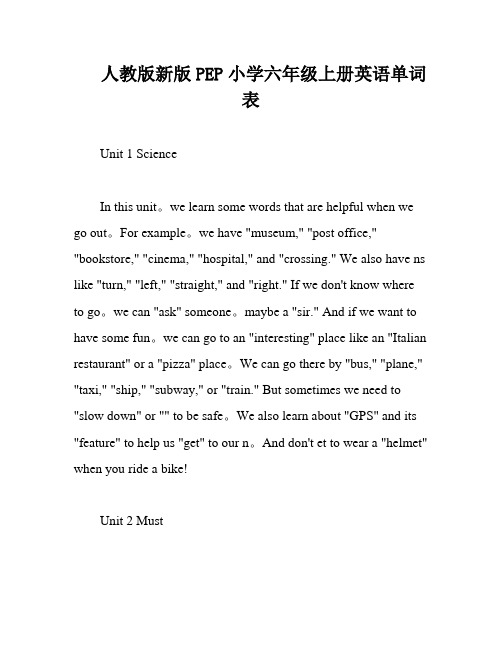
人教版新版PEP小学六年级上册英语单词表Unit 1 ScienceIn this unit。
we learn some words that are helpful when we go out。
For example。
we have "museum," "post office," "bookstore," "cinema," "hospital," and "crossing." We also have ns like "turn," "left," "straight," and "right." If we don't know where to go。
we can "ask" someone。
maybe a "sir." And if we want to have some fun。
we can go to an "interesting" place like an "Italian restaurant" or a "pizza" place。
We can go there by "bus," "plane," "taxi," "ship," "subway," or "train." But sometimes we need to "slow down" or "" to be safe。
We also learn about "GPS" and its "feature" to help us "get" to our n。
人教版pep小学英语六年级上册单词表汇总
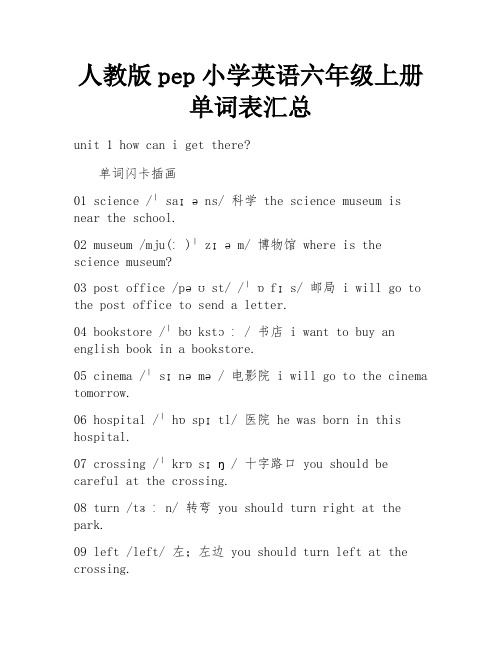
人教版pep小学英语六年级上册单词表汇总unit 1 how can i get there?单词闪卡插画01 science /ˈsaɪəns/ 科学 the science museum is near the school.02 museum /mju(ː)ˈzɪəm/ 博物馆 where is the science museum?03 post office /pəʊst/ /ˈɒfɪs/ 邮局 i will go to the post office to send a letter.04 bookstore /ˈbʊkstɔː/ 书店 i want to buy an english book in a bookstore.05 cinema /ˈsɪnəmə/ 电影院 i will go to the cinema tomorrow.06 hospital /ˈhɒspɪtl/ 医院 he was born in this hospital.07 crossing /ˈkrɒsɪŋ/ 十字路口 you should be careful at the crossing.08 turn /tɜːn/ 转弯 you should turn right at the park.09 left /left/ 左;左边 you should turn left at the crossing.10 straight /streɪt/ 笔直地 turn right. then go straight.11 right /raɪt/ 右;右边 turn right here.12 ask /ɑːsk/ 问 can i ask you some questions?13 sir /sɜː/ 先生 can i help you, sir?14 interesting /ˈɪntrɪstɪŋ/ 有趣的 this book is very interesting.15 italian /ɪˈtæliən/ 意大利的 my cousin is an italian girl.16 restaurant /ˈrestrɒnt/ 餐馆 this is a new restaurant.17 pizza /ˈpiːtsə/ 比萨饼 i like pizza.18 street /striːt/ 大街;街道 the cinema is on dongfang street.19 get /get/ 到达 how can i get there?20 gps /ʤiː-piː-es/ 全球(卫星)定位系统 the gps is new.21 gave /geɪv/ 提供;交给 i gave my sister a pen this morning.22 feature /ˈfiːʧə/ 特点 the dog has a new feature.23 follow /ˈfɒləʊ/ 跟着 follow your mother, please.24 far /fɑː/ 远的,遥远的 my home is far from the zoo.25 tell /tel/ 告诉,讲述 let me tell you my name.单词闪卡网页学习和教学:单词闪卡手机学:扫码查看有声单词闪卡 unit 1unit 2 ways to go to school单词闪卡插画01 on foot /ɒn/ /fʊt/ 步行 i go to school on foot.02 by /baɪ/ 乘 i go to school by bus.03 bus /bʌs/ 公共汽车 they go to the park by bus.04 plane /pleɪn/ 飞机 we will go the usa by plane.05 taxi /ˈtæksi/ 出租汽车 you can go there by taxi.06 ship /ʃɪp/ (大)船let’s go to sh anghai by ship.07 subway /ˈsʌbweɪ/ 地铁 you can go to the library by subway.08 train /treɪn/ 火车 he goes to kunming by train.09 slow /sləʊ/ 慢的 the taxi driver slows down at the yellow light.10 down /daʊn/ 减少;降低 the taxi driver slows down at the yellow light.11 slow down /sləʊ/ /daʊn/ 慢下来 the taxi driver slows down at the yellow light.12 stop /stɒp/ 停下来 the car stops and waits at the red light.13 mrs 夫人 good morning, mrs smith!14 early /ˈɜːli/ 早到的 you are early.15 helmet /ˈhelmɪt/ 头盔 i have a new helmet.16 must /mʌst/ 必须 in the usa people on bikes must wear a helmet.17 wear /weə/ 穿着,佩戴 my sister wears a hat.18 attention /əˈtenʃ(ə)n/ 注意,注意力 let me have your attention!19 pay attention to /peɪ/ /əˈtenʃ(ə)n/ /tʊ/ 注意i must pay attention to the traffic lights.20 traffic /ˈtræfɪk/ 交通 traffic is busy now.21 traffic lights /ˈtræfɪk/ /laɪts/ 交通信号灯 i must pay attention to the traffic lights.22 munich /ˈmjuːnɪk/ 慕尼黑23 germany /ˈʤɜːməni/ 德国 my uncle and aunt live in germany.24 alaska /əˈlæskə/ 阿拉斯加州25 sled /sled/ 雪橇tina’s sled is new.26 fast /fɑːst/ 快的;迅速的 the subway is very fast.27 ferry /ˈferi/ 轮渡 there is a big ferry over there.28 papa westray /pəˈpɑː/ westray 帕帕韦斯特雷岛29 scotland /ˈskɒtlənd/ 苏格兰单词闪卡网页学习和教学:单词闪卡手机学:扫码查看有声单词闪卡 unit 2unit 3 my weekend plan单词闪卡插画01 visit /ˈvɪzɪt/ 拜访 i often visit my grandparents on weekends.02 film /fɪlm/ 电影let’s see a film this afternoon.03 see a film /siː/ /ə/ /fɪlm/ 看电影let’s see a film this afternoon.04 trip /trɪp/ 旅行 we want to take a trip on summer holiday.05 take a trip /teɪk/ /ə/ /trɪp/ 去旅行 we want to take a trip on summer holiday.06 supermarket /ˈsjuːpəˌmɑːkɪt/ 超市 my mother often goes to the supermarket on sunday.07 evening /ˈiːvnɪŋ/ 晚上;傍晚 i often read storybooks in the evening.08 tonight /təˈnaɪt/ 今夜;今晚 there will be a basketball match tonight.09 tomorrow /təˈmɒrəʊ/ 明天 my father will go fishing tomorrow.10 next week /nekst/ /wiːk/ 下周 they will go on a picnic next week.11 dictionary /ˈdɪkʃ(ə)n(ə)ri/ 词典 i bought a new dictionary.12 ic /ˈkɒmɪk/ 滑稽的;喜剧的 my brother is readinga ic book.13 ic book /ˈkɒmɪk/ /bʊk/ (儿童的)连环画册 my brother is reading a ic book.14 word /wɜːd/ 单词 this word book is very helpful.15 word book /wɜːd/ /bʊk/ 单词书 this word book is very helpful.16 postcard /ˈpəʊstkɑːd/ 明信片 i will send him a postcard.17 lesson /ˈlesn/ 课 we are going to have an english lesson.18 space /speɪs/ 太空 this is a book about space.19 travel /ˈtrævl/ 旅行 i like travel.20 half /hɑːf/ 一半 i do my homework for half an hour every day.21 price /praɪs/ 价格 the price of the bag is high.22 mid-autumn festival /mɪd/-/ˈɔːtəm//ˈfestəvəl/ 中秋节 today is mid-autumn festival.23 together /təˈgeðə/ 一起let’s go to school together.24 get together /get/ /təˈgeðə/ 聚会 my family is going to get together and have a big dinner.25 mooncake 月饼 would you like a mooncake?26 poem /ˈpəʊɪm/ 诗 i like this poem.27 moon /muːn/ 月亮;月球 the moon is so bright tonight.单词闪卡网页学习和教学:单词闪卡手机学:扫码查看有声单词闪卡 unit 3unit 4 i have a pen pal单词闪卡插画01 studies /ˈstʌdiz/ 学习 he studies chinese very carefully.02 puzzle /ˈpʌzl/ 谜;智力游戏 my mother often does word puzzles with me on the weekend.03 hiking /ˈhaɪkɪŋ/ 远足 she goes hiking with her friends.04 pen pal /pen/ /pæl/ 笔友 i have a new pen pal.05 hobby /ˈhɒbi/ 业余爱好 my hobby is playing football.06 jasmine /ˈʤæsmɪn/ 茉莉 i like jasmine.07 idea /aɪˈdɪə/ 想法;主意 this is a good idea.08 canberra /ˈkænb(ə)rə/ 堪培拉 my pen pal lives in canberra.09 amazing /əˈmeɪzɪŋ/ 令人惊奇的 how amazing!10 shall /ʃæl/ 表示征求意见 shall we dance?11 goal /gəʊl/ 射门 rabbit scores ten goals.12 join /ʤɔɪn/ 加入 i want to join you.13 club /klʌb/ 俱乐部;社团 please join our club.14 share /ʃeə/ 分享;共用let’s share the delicious food.单词闪卡网页学习和教学:单词闪卡手机学:扫码查看有声单词闪卡 unit 4unit 5 what does he do?单词闪卡插画01 factory /ˈfæktəri/ 工厂 my aunt works in the factory.02 worker /ˈwɜːkə/ 工人 the worker works hard every day.03 postman /ˈpəʊstmən/ 邮递员 the postman is very busy every day.04 businessman /ˈbɪznɪsmən/ 商人 his uncle is a businessman.05 police officer /pəˈliːs/ /ˈɒfɪsə/ 警察 there is a police officer on the street.06 fisherman /ˈfɪʃəmən/ 渔民 the fisherman swims very well.07 scientist /ˈsaɪəntɪst/ 科学家 the scientist knows much about the sun.08 pilot /ˈpaɪlət/ 飞行员 miss brown is a pilot.09 coach /kəʊʧ/ 教练 the coach is very strict with us.10 country /ˈkʌntri/ 国家 which country do you live in?11 head teacher /hed/ /ˈtiːʧə/ 校长ann’s mothe r is our head teacher.12 sea /siː/ 大海 i like swimming in the sea.13 stay /steɪ/ 保持 i want to stay healthy.14 university /ˌjuːnɪˈvɜːsɪti/ 大学 he is a university student.15 gym /ʤɪm/ 体育馆,健身房 the gym is very big.16 if /ɪf/ 如果 if you like sports, you can be a coach.17 reporter /rɪˈpɔːtə/ 记者 uncle li is a reporter.18 use /juːz/ 使用 may i use your pen?19 type /taɪp/ 打字 can you type?20 quickly /ˈkwɪkli/ 迅速地 jim can run quickly.21 secretary /ˈsekrətri/ 秘书amy’s cousin is a secretary.单词闪卡网页学习和教学:单词闪卡手机学:扫码查看有声单词闪卡 unit 5。
最新PEP人教版六年级英语上册新版PEP六年级上册unit6_A_lets_talk课件
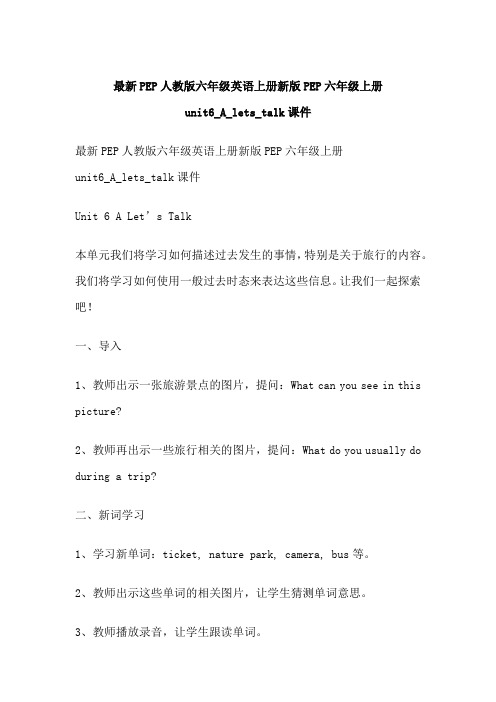
最新PEP人教版六年级英语上册新版PEP六年级上册unit6_A_lets_talk课件最新PEP人教版六年级英语上册新版PEP六年级上册unit6_A_lets_talk课件Unit 6 A Let’s Talk本单元我们将学习如何描述过去发生的事情,特别是关于旅行的内容。
我们将学习如何使用一般过去时态来表达这些信息。
让我们一起探索吧!一、导入1、教师出示一张旅游景点的图片,提问:What can you see in this picture?2、教师再出示一些旅行相关的图片,提问:What do you usually do during a trip?二、新词学习1、学习新单词:ticket, nature park, camera, bus等。
2、教师出示这些单词的相关图片,让学生猜测单词意思。
3、教师播放录音,让学生跟读单词。
三、对话学习1、教师出示对话图片,让学生了解对话背景。
2、教师播放对话录音,让学生了解对话内容。
3、教师带领学生逐句学习对话,并解释生词和语法。
4、教师让学生模仿对话,进行口语练习。
四、语言运用1、教师出示一张旅行计划表格,让学生用一般过去时态描述表格中的活动。
2、教师让学生模仿对话中的句型,描述自己的旅行经历。
五、作业1、背诵本单元新单词和对话。
2、用一般过去时态描述一次自己的旅行经历。
六、总结本单元我们学习了如何使用一般过去时态描述过去发生的事情,特别是关于旅行的内容。
我们要掌握相关单词和句型的用法,并能够运用到实际生活中。
英语人教版六年级上册新版pep小学英语六年级上册第一单元课件英语人教版六年级上册新版pep小学英语六年级上册第一单元课件Welcome to Unit 1 “How can I get to the library?”Section A1、词汇掌握与运用掌握以下单词的拼写和意义:1、subway2、bus3、taxi4、train5、bike6、fly能够运用这些单词进行简单的英语对话和写作。
PEP人教版小学英语六年级上册Unit1听写单词表

8
[teɪst]
n.品尝,尝味;味道;味觉;鉴赏力vt.品尝,尝味;吃,喝;有. . .味道
9
[mæp]
n.地图
10
[nɔ:θ]
a.北的;朝北的;从北来的ad.向(在、从)北方n.北;北方;北部
11
[saʊθ]
a.南(方)的;向南的;从南来的ad.在南方;向南方;自南方n.南;南方;南风;南部
17
[ðəˈjæŋzɪˈrɪvə]
长江
18
['fɒgɪ]
a.多雾的
19
['spaɪsi:]
adj.芳香的(辛辣的)
20
[sɪlk]
n. (蚕)丝,丝织品
21
['fɒrɪst]
n.森林
22
[stəun]
n.石头,石料
PEP人教版小学英语六年级上册
Unit1听写单词
1
[ˈmɔːnɪŋtiː]
早茶
2
[su:p]
n.汤
3
['gɑ:dn]
n.花园,果园,菜园
4
[ði potala 'pælis]
布达拉宫(拉萨)
5
[ði 'sʌmə'pælis]
颐和园
6
[ðəˌterəˈkɒtəˈɑːmɪ]
兵马俑
7
[və'keiʃən]
12
[i:st]
a.东方的;东部的;朝东的;从东方来的ad.在东方;向东方;从东方n.东,东方;东部
13
[west]
a. (在)西的;向西的;从西来的ad.在西方;向西方n.西部;西方
14
['feiməs]
人民教育出版社小学英语PEP教材六年级上册
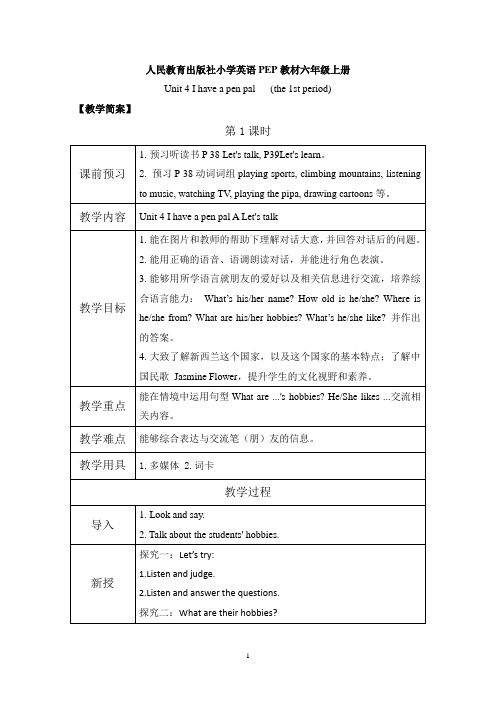
人民教育出版社小学英语PEP教材六年级上册Unit 4 I have a pen pal (the 1st period) 【教学简案】第1课时【教学详案】课前预习:1.预习听读书P 38 Let's talk, P39Let’s learn.2.预习P 38动词词组playing sports, climbing mountains, listening to music, watching TV, playing the pipa, drawing cartoons等。
教学内容:Unit 4 I have a pen pal A Let's talk教学目标:1.能在图片和教师的帮助下理解对话大意,并回答对话后的问题。
2.能用正确的语音、语调朗读对话,并能进行角色表演。
3.能够用所学语言就朋友的爱好以及相关信息进行交流,培养综合语言能力:What’s his/her name? How old is he/she? Where is he/she from? What are his/her hobbies? What’s he/she like? 并作出的答案。
4. 大致了解新西兰这个国家,以及这个国家的基本特点;了解中国民歌Jasmine Flower,提升学生的文化视野和素养。
教学重点:能在情境中运用句型What are ...'s hobbies? He/She likes ...交流相关内容。
教学难点:能够综合表达与交流朋友的信息。
教学用具:1.多媒体 2.词卡教学过程:一、Warming up1. Look and say.T: Look at the pictures, what are their hobbies?S: He/she likes ... (singing, dancing, doing kung fu, reading stories, playing football, playing the pipa, drawing cartoons, playing basketball, listening to music)2. Talk about the students' hobbies.T: I like listening to music and reading books. What are your hobbies?S: I like ...Pair work设计意图:师生交谈,引入话题,在观看图片和交流的过程中激活已学过的动词词组,自然地操练问答爱好的句型。
人民教育出版社小学英语PEP教材六年级上册

人民教育出书社小学英语PEP教材六年级上册Unit 3My weekend plan(the 4thperiod)【教学简案】第4课时【教学详案】课前预习:1.预习听读书P27 Lets' learn教学内容:Unit 3 My weekend plan B Let's learn教学目标:1.能够听、说、读、写本课时主要单词或词组:dictionary, comic book, word book, postcard.2.能够听、说、认读句子:Where are we going I'm going to buy ...等句型描述本身要买的物品。
教学重点:能传闻读写单词:dictionary, comic book, word book, postcard.教学难点:够在情景中运用核心句型完成简单的交际任务。
教学用具:1.多媒体教学过程:一、Warming up1. Enjoy the song: What are you going to doT: Let's listen and sing together.设计意图:歌曲切合本课主题,节奏欢快,易于跟唱,调动学生学习热情。
2. Pair work: What are you/is he going to do(1) T: I'm going to listen to music this evening. What are you going to do this evening S: I'm going to ...教师和一名学生示范问答之后,让学生两人一组,按照实际情况互问互答(2) 课件出示John头像T: What is he going to do this afternoonS: He is going to see a film.T: What is he going to do this eveningS: He is going to buy some books.设计意图:对话问答首先结合学生实际,引出本课话题。
- 1、下载文档前请自行甄别文档内容的完整性,平台不提供额外的编辑、内容补充、找答案等附加服务。
- 2、"仅部分预览"的文档,不可在线预览部分如存在完整性等问题,可反馈申请退款(可完整预览的文档不适用该条件!)。
- 3、如文档侵犯您的权益,请联系客服反馈,我们会尽快为您处理(人工客服工作时间:9:00-18:30)。
Unit Two 第二单元Ways to go to school 怎样去上学A: Wait! Don't go at the red light. 等等!别闯红灯。
B: Sorry. 对不起。
A: You must pay attention to the traffic lights. 你必须注意交通灯。
A: Good morning, John. 早上好,约翰。
How do you go to school? 你怎么上学?B: I often go by subway. 我经常乘地铁。
A: Hi, Mike. Is this your bike? 嗨,迈克。
这是你的自行车吗?B: Yes. 是的。
A: Nice! 真棒!B: Thanks! How do you come to school? 谢谢!你怎么来学校的?A: I usually come on foot. 我通常步行来。
-------------------A Let's try 试一试Amy meets Mike at school this morning. 艾米早上在学校遇到了迈克。
Listen and tick or cross. 听,然后打勾或打叉。
A: Morning, Mike. 早上好,迈克。
B: Morning. 早上好。
Hey, don't forget. 嘿,别忘了。
Mrs Smith will take us to the nature park next Wednesday. 下周三史密斯夫人要带我们去自然公园。
A: Oh, yes. 哦,是的。
How do we get to the nature park? 我们怎么去自然公园?B: By bus. 坐公交车去。
A: Look! There's Mrs Smith now. 看!史密斯夫人来了。
-------------------Let's talk 谈话Mike: Good morning, Mrs Smith! 早上好,史密斯夫人!Mrs Smith: Hi, children. 嗨,孩子们。
You're early. 你们真早。
How do you come to school? 你们怎么来学校的?Amy: Usually, I come on foot. 通常我步行来。
Sometimes I come by bus. 有时坐公交车。
Mike: I often come by bike. 我经常骑自行车来。
Amy: How do you come to school, Mrs Smith? 您怎么来学校,史密斯夫人?By car? 开车吗?Mrs Smith: Sometimes, but I usually walk. 有时是,不过我通常走路来。
Mike: That's good exercise. 这是很好的锻炼。
How do Mike, Amy and Mrs Smith come to school? 迈克、艾米和史密斯夫人怎么来学校?-------------------Let's learn 学习Mrs Smith: Let's go to the nature park. 我们去自然公园吧。
John: Hooray! 万岁!Sarah: How do we get there? 我们怎么去那儿?Mrs Smith: By bus. 坐公交车。
on foot 步行by bus 乘坐公交车by taxi 乘坐出租车by plane 乘坐飞机by ship 乘坐轮船by subway 乘坐地铁by train 乘坐火车-------------------B Let's try 试一试What does Mrs Smith tell the children to do? 史密斯夫人让孩子们做什么?Listen and tick. 听,并打勾。
A: Children, let's get on the bus. 孩子们,我们上公交车吧。
B: Yeah! 好啊!A: You should get on one by one. 你们要一个一个地上车。
B: OK. 好的。
B: Mrs Smith, where is Wu Yifan? 史密斯夫人,吴一凡在哪儿啊?A: He's not coming. 他不来了。
His grandpa is ill. 他爷爷病了。
B: I'm sorry to hear that. 我听了很难过。
-------------------Let's talk 谈话Wu Yifan: Mr Jones, how can I get to the Fuxing Hospital? 琼斯先生,我怎样可以到复兴医院呢?Mr Jones: Take the No. 57 bus over there. 去那边坐57路公共汽车。
Wu Yifan: Thanks. Wow! So many pictures of bikes! 谢谢。
哇!这么多自行车照片!Mr Jones: They're from my cousin in the USA. 这是我美国的表弟拍的。
Wu Yifan: What's this? 这是什么?Mr Jones: A helmet. 是头盔。
In the USA people on bikes must wear one. 在美国,人们骑车必须戴头盔。
Wu Yifan: I see. 我知道了。
Oh, the bus is coming! 哦,公共汽车来了!Bye, Mr Jones. 再见,琼斯先生。
♪Mr Jones: Hey, don't go at the red light! 嘿,别闯红灯!Wu Yifan: Oh, right! Thanks. 哦,对了!谢谢。
I must pay attention to the traffic lights! 我必须注意交通灯。
What do you learn about riding a bike from the dialogue? 从对话中,你对骑自行车有什么了解?-------------------Let's learn 学习Mike: Look! The park is over there! 看!公园在那边!Let's go! 我们去吧!Mrs Smith: Please wait! 请等一等!It's red now. 现在是红灯。
We must stop and wait. 我们必须停下来等待。
Slow down and stop at a yellow light. 黄灯慢行停车。
Slow down 慢行stop 停止Stop and wait at a red light. 红灯停车等待。
wait 等待Go at a green light. 绿灯行车。
go 走-------------------Read and write 读读写写Different ways to go to school 不同方式去上学Some children go to school on foot in Munich, Germany. 在德国慕尼黑,一些孩子步行上学。
In Alaska, USA, it snows a lot. 在美国阿拉斯加,雪下得很大。
Some kids go to school by sled. 一些孩子乘雪橇上学。
It's fast. 速度很快。
Some children in Jiangxi, China, go to school by ferry every day. 在中国江西,一些孩子每天坐渡船上学。
In Papa Westray, Scotland, the children go to school by ferry, too. 在苏格兰的帕帕韦斯特雷岛,孩子们也坐渡船去上学。
But in 2009, they went to school by plane because the ferry didn't work. 但是在2009年,因为渡船故障,他们坐飞机去上学。
A: Grandpa, let me read this for you. 爷爷,我来给您读书听吧。
B: Thanks, Robin. 谢谢,罗宾。
A: I don't go to school. 我不上学。
I learn at home. 我在家里学习。
-------------------Tips for pronunciation 发音方法小提示Listen, look and say. 听,看,说。
come and have a look 来看一下pictures of ……的图画stop at a red light 红灯停-------------------Let's check 检查Listen and number. 听,写序号。
1.A: Excuse me, how can I get to the park? 打扰一下,我怎么走可以去公园?........更多文字内容,请下载课件后,鼠标划选择复制:/s/blog_96caa2d30102vobo.htmlB: OK.♪What will the woman do? 女子会怎么做?-------------------C Story time 故事时间Amy: It's so good to see you, Annie! 很高兴见到你,安妮!Annie: You too, Amy.见到你也很高兴,艾米。
I missed you. 我很想你。
Annie: Wow, Chinese food is so different from British food. 哇,中餐和西餐真不一样。
Amy: Yes. Can you use chopsticks? 是的。
你会用筷子吗?Annie: No, I can't. 我不会。
Amy: Let's take a bus home. 我们坐公交车回家吧。
We must cross the road. 我们要过马路。
In the UK you drive on the left side. 在英国,开车要走左边。
In China, people drive on the right side. 在中国,人们开车要走右边。
